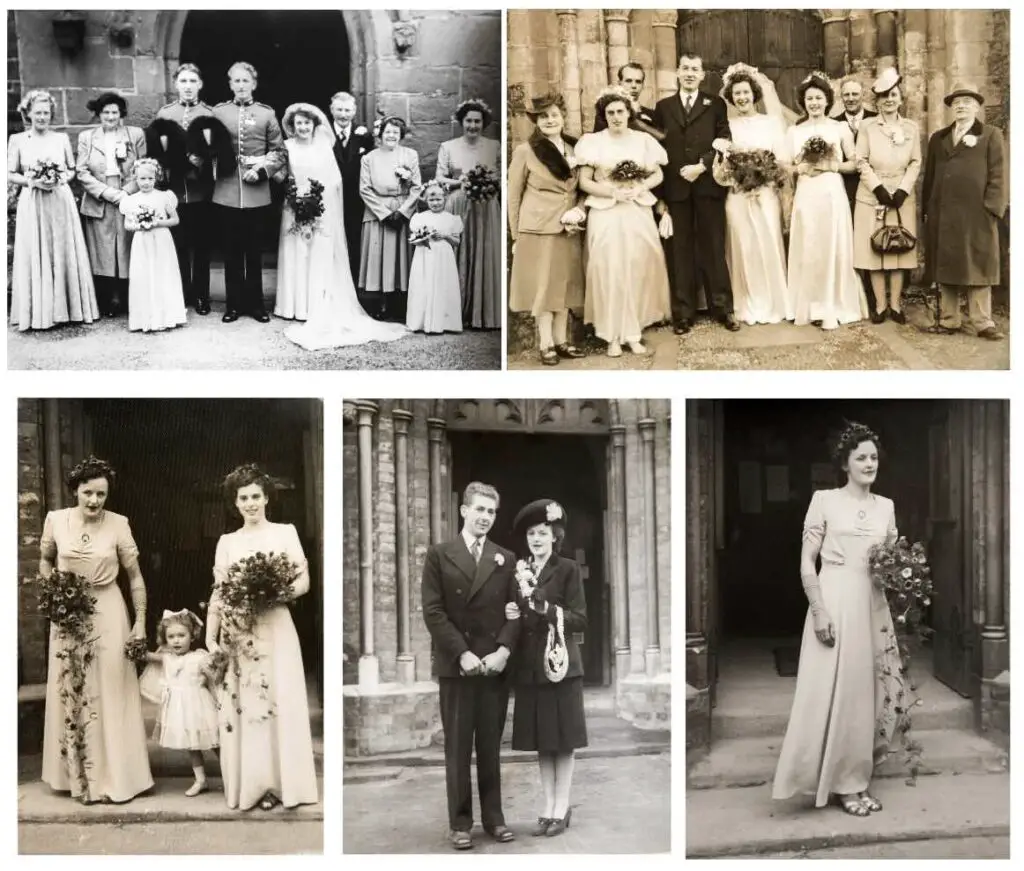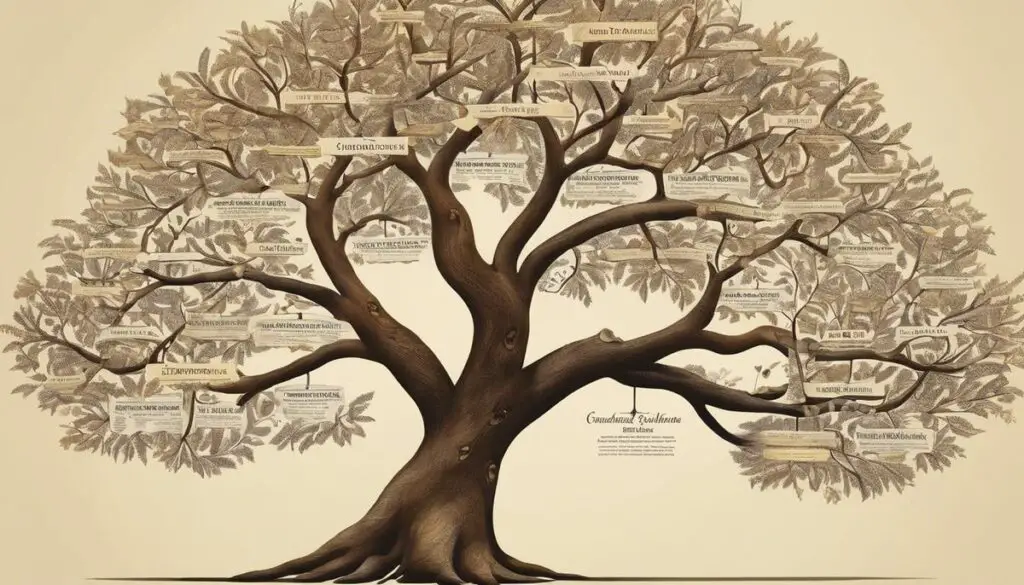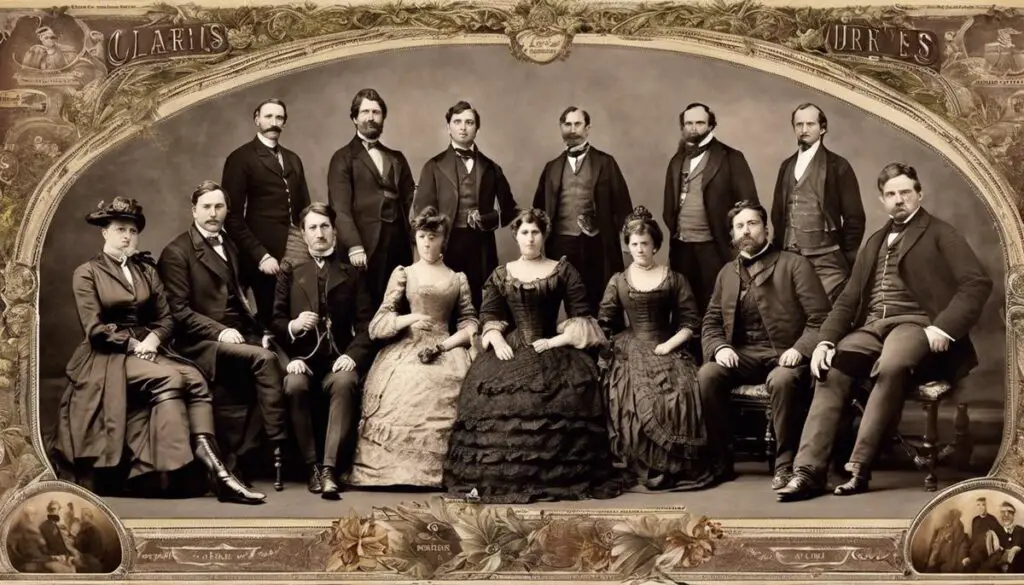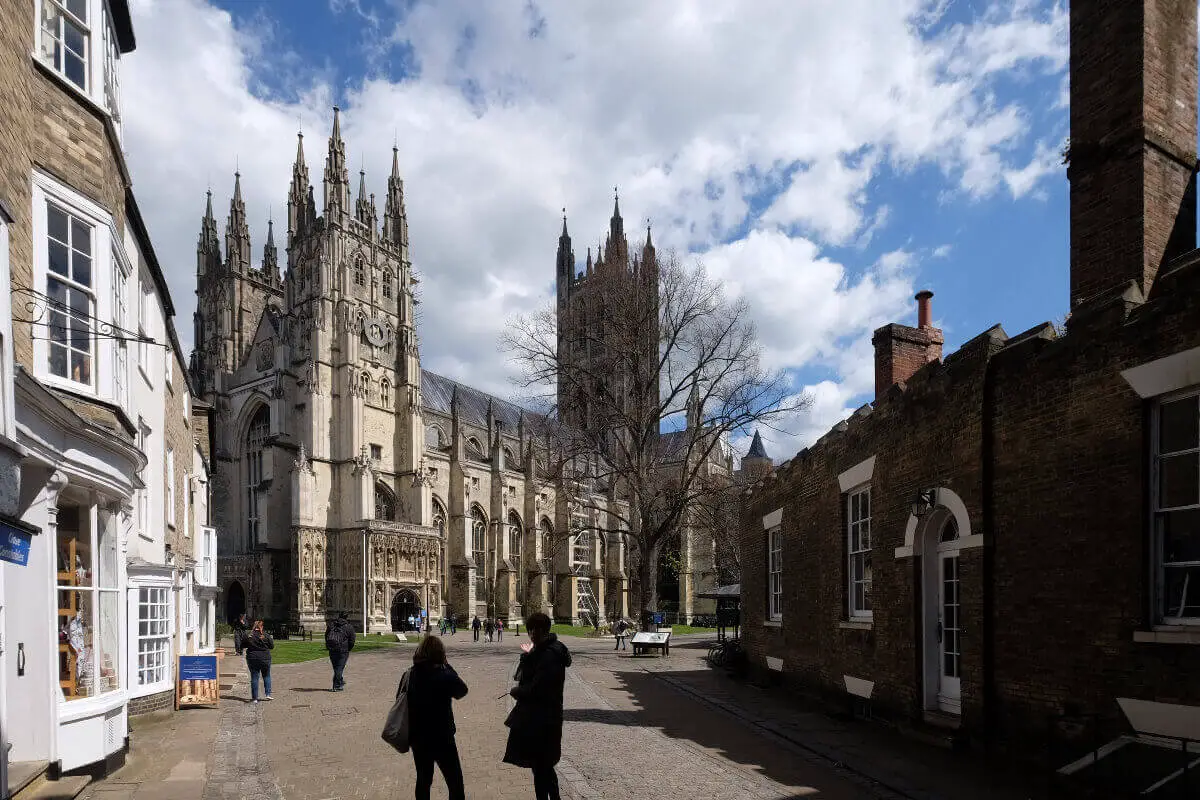As the backbone of one’s identity, last names are significant in narrating societal lineage’s cultural, geographical, and historical chronicles. In the 1800s, British surnames, in particular, mirrored these facets, deeply embedded in a rich tapestry of occupational, regional, and societal influences.
Exploring the origins of these surnames unfolds intriguing stories tied to different aspects of life during this era. The tale doesn’t end on British soil; such names scattered across the globe, adapting and assimilating within varied local contexts, significantly shaping the cultural fabric of multiple regions, particularly during the Imperial epoch and the Industrial Revolution.
Table of Contents
- Origins of British Last Names in the 1800s
- Tracing the Migration of British Last Names in the 1800s
- Social Implications of British Last Names in the 1800s
- Evolution of British Last Names post-1800s
- Related Questions
Origins of British Last Names in the 1800s
Unlocking the Origins, Traditions, and Patterns of British Last Names in the Victorian Era
The 19th Century, colloquially known as the Victorian era, they presented a seismic shift in the nominal landscapes of Britain. As the nation burgeoned demographically and geographically, thanks to the Industrial Revolution, its people adopted last names or surnames in higher frequency, transitioning away from the historical convention of single names. This article seeks to emphatically dissect the origins, traditions, and patterns that underlay this significant societal progress.
Commencing with the origins, the adoption of surnames in Britain occurred in multiple phases influenced by several cultural, social, and economic factors. Initially, British surnames bore roots in paternalism, with many surnames indicating a respectful relationship, like ‘Johnson’ representing ‘John’s son.’
However, by the 1800s, this method of surname origin had notably evolved due to increased urbanization and the corresponding necessity for distinct identification.
Turning to the traditions that shaped the creation of these surnames, four significant methodologies became prevalent throughout the 19th Century. One of the most commonplace was occupational naming, where individuals were assigned surnames based on their trade or profession, such as ‘Smith,’ ‘Baker,’ and ‘Carpenter.’
Other classifications of surnames were patronymic, descriptive, and topographic. Patronymic surnames are derived from an individual’s father’s first name with the suffixes’ son’ or ‘s,’ for example, ‘Jackson’ or ‘Williams.’ An individual’s characteristics influence descriptive surnames. ‘Long,’ ‘Short,’ or ‘White’ aptly embodies this tradition.
Finally, topographic surnames were bestowed based on natural objects, landmarks, or geographical features connected to an individual’s residence. Examples include ‘Hill,’ ‘Brook’, or ‘Field.’
As population growth accelerated, the requirement for systematic and precise identification intensified, aligning more closely with bureaucratic procedures. This trend led to several patterns in the creation of British last names by the late 1800s. A surname’s permanency and heredity, especially concerning its passage down the paternal line, became standard practice.
Despite variant phonetics, consistent written spelling further enhanced and established the fixity of surnames.
Moreover, the Victorian advancement in literacy rates played a pivotal role in standardizing surnames. As written communication increased, the spelling discrepancies and erroneous transcriptions of surnames were reduced.
Consequently, specific surnames, particularly those with easy phonetics and typography, became more common due to their ease of spelling and pronunciation.
In plunging into the fascinating tapestry of British last names, an intricate compilation of origins, traditions, and patterns unfolds. From the familial to the descriptive, the professional, to geographical – these nomenclature mechanisms of yesteryears serve as critical tools for charting societal evolution during the transformative 1800s.
Today, they serve as genealogical footprints, offering subtle whispers of our ancestors’ lives, professions, and locations — a genuine testament to their enduring relevance.

Tracing the Migration of British Last Names in the 1800s
The dissemination of British last names worldwide in the 19th Century cannot be overlooked in the historical backdrop.
To comprehend this widespread dispersion, one must acknowledge the significant role of the British Empire in this era. At its zenith, almost a quarter of the world’s population was under its rule, resulting in an undeniable dominance in politics, culture, and language.
As colonies were established, these surnames inevitably bled into local populations, consequently influencing the surname landscape in these regions.
For instance, consider regions like Australia, New Zealand, and Canada, where British influence is indisputable. Here, British surnames were not merely adopted, but also local duplicates were created by indigenous populations.
While these surnames are related to their British antecedents in structure and phonology, differences arose out of cultural assimilation processes. Over time, the patronymic and occupational British surnames assimilated into another cultural context, creating a novel layer of complexity.
Moving further east, one can see the impact of British colonial rule on last names even today. For example, British surnames such as ‘Brown,’ ‘Johnson,’ and ‘Smith’ are still used in India.
However, akin to a linguistic palimpsest, these surnames have merged or added as prefixes or suffixes to indigenous names, often as markers of the colonial past. Such confluence of indigenous and colonial cultures through the prism of last names deepens our understanding of indirect colonial influence.
The transatlantic slave trade also played a significant role in disseminating British last names. Enslaved Africans were routinely given the surnames of their owners, a majority of whom were British.
As descendants of these individuals eventually spread across the globe, particularly into the Americas, they continued to bear these last names: a poignant reminder of a painful historical legacy.
The subsequent Industrial Revolution and its civic requirements also aided the spread of British surnames. An ever-increasing need for precise identification for census-taking, taxation, and other bureaucratic procedures spurred using surnames, specifically in urban settings.
Hence, the increasing global movement of the urbanized workforce with British surnames disseminated these heritage markers far and wide.
Various missions and enterprises led by Britons also played pivotal roles. As missionaries spread the Christian faith, they frequently bestowed new converts with British surnames, a practice highly prevalent in Africa and Asia. Similarly, trading endeavors opened avenues for British monikers in yet unexplored territories.
In conclusion, the propagation of British surnames during the 1800s was influenced by socio-political factors, from colonial expansion to economic and religious expeditions.
As these names continue to resonate across geographical boundaries today, they bear testament to the extent and influence of the British Empire in shaping the world’s surname landscape.

Social Implications of British Last Names in the 1800s
In delving deeper into the social significance of British last names in the Victorian era, it’s crucial to consider the role of the prevailing societal hierarchies and norms. British society relied heavily on surnames for class identification.
Their allocation often reflected societal status and occupation, and over time, these designations became indicators of social standing, effectively reflecting Britain’s rigid class system. For instance, surnames derived from trades – such as Smith or Baker – often signified the working class. In contrast, those derived from geographical features or estates reflected the land-owning gentry and nobility.
The entrenched societal order played a significant role in preserving last names within their respective classes. Marriage, a primary means of surname exchange, often occurred within the same social strata, preserving the status quo.
It’s worth noting that women typically adopted their husband’s surnames upon marriage, further asserting the patriarchal structure prevalent in that era.
Exploring the impact of the Victorian era’s class consciousness extends to law and property. Fowler notes that wills, property rights, and inheritance laws influenced the permanency and heredity of surnames.
Where lineage was important, surnames served as a cornerstone, preserving familial lines and upholding class distinctions, and thus, their socioeconomic implications were immense.
Adding to this, it’s essential to acknowledge the extraordinary influence of the British Empire during the 19th Century. The Empire propagated British surnames across its colonies, resulting in a global impact.
This period showed a significant increase in British surnames in regions of colonial influence, such as Australia, New Zealand, and Canada. The colonized indigenous people often had to adopt British surnames, sometimes merging with their native nomenclatures.
However, the British colonial influence varied in places like India, where indigenous names coexisted with or were modified to have a British undertone. The coalescence indicates the complexity of colonial interaction and the nuanced cultural adaptation and assimilation processes.
Henry notes a similar pattern in the American South, where enslaved Africans were often given their owners’ surnames, thereby marking the cruel imprint of the transatlantic slave trade.
During the Industrial Revolution, the population density increased in urban areas, and bureaucratic procedures and rerecord-keeping led to the further standardization and dissemination of British surnames. Additionally, missions and trade expeditions played a crucial role in exporting British surnames to distant corners of the globe, thus shaping our present surname landscape.
The 19th Century encapsulates a crucial period in disseminating and standardizing British surnames. Understanding this aids in appreciating the complex interplay of societal norms, class system, colonialism, and increasing globalization, which have shaped today’s surnames’ cultural and historical complexities.

Evolution of British Last Names post-1800s
The meticulous documentation of British surnames allows exploration of the intricate journey of their evolution. With an understanding of their origin, dynamics, adoptions, and standardizations until the close of the 19th Century, our focus turns to their further metamorphosis into the modern age.
Migration, a core agent of change, has critically impacted the transformation of British surnames. Widespread international diaspora, particularly in North America, Australia, and New Zealand, resulted in a wholesale shift in the landscape of surnames.
Immigration yielded increased diversity as foreign pronunciations, spellings, and translations folded into the existing vocabulary. Thus, the 20th Century brought a remixing of British surnames, their uniqueness often diluted in the melting pot of global migration.
Simultaneously, societal shifts within Britain altered surname usage. Notably, the rise of women’s equal rights during the 20th Century began to disrupt the tradition of wives universally adopting their husbands’ surnames.
The Married Women’s Property Act of 1882 can be seen as the foreground for this shift, unlocking the right for women to own property and manage their wealth independently of their husbands. As women gained more rights and independence, impacting their societal standing, a trend of maiden name retention, hyphenation, and double-barreling emerged, blurring lines of surname heritage.
Technological advancements in the 20th Century expedited surname mutation as well. The advent of telephony, where spellings and pronunciations needed to be shared aurally rather than written, inevitably led to phonetic alterations and abbreviations.
Another striking influence was the computer’s lack of support for special characters and the inability to support all nations’ keystrokes within a single format linguistically. This resulted in an anglicization, such as Muller becoming Miller.
Globalization further played a role, with English becoming the universal language of commerce and science. The exchanges brought about by employment, education, and other socioeconomic factors encouraged many to shed culturally specific elements of their surnames and adopt more anglicized versions.
This is particularly notable in cultures such as those of China and South Korea, where adopting an English or anglicized name alongside their native name is frequent.
The socio-political upturns of the late 20th Century also infused new elements into the surname mosaic. As the British Commonwealth loosened its ties and granted independence to many territories, a long-suppressed surge of national identity culminated in a movement to return to indigenous surnames or adopt new names to reflect political, cultural, and personal transformations, furthering the diversity of surnames.
While determinism in the trajectories of British surnames persists, the ever-evolving dynamics of personal identity, family heritage, and global interaction continue to shape their course.
These unprecedented changes reflect upon the intricate tapestry of an ever-globalizing world while underscoring the enduring roots of heritage and tradition. Hence, studying these evolutions provokes a profound fascination, tracing heritage and illuminating human adaptability. It is a testimony to change, interaction, and, evidently, the extraordinary saga of civilization itself.

Plunging into exploring British last names from the 1800s to today unveils a captivating journey of migration, societal change, and evolution. These family names are far more than mere appellations; they are historical markers, signposting the social class distinctions, professional backgrounds, geographical roots, and the changing tides of societal norms over centuries.
As we move beyond the 1800s, the evolution of these last names continues to reflect the dynamic shifts in language, societal standards, and interracial bonding. These age-old surnames, now dispersed globally, are enduring symbols of British heritage, shedding light on the past and subtly shaping the present cultural and social fabric.
The Hummel Family is a website all about Family History research. We focus on Swedish, German, English, Scottish, and American Genealogy. We also discussed Asia and China, as we had ancestors who spent many years in China.
You are welcome to join us and become part of our community by signing up for our FREE newsletter, The Hummel Family; sign up by clicking here.
Also, check out our Youtube Channel, Family HIstory Buzz, by clicking here.
Related Questions
What Are Things You Discovery By Doing Your Family History Work?
By researching your family history, you can learn about new family members you did not know about. You will learn about the place where your family once lived. And finally, you can discover the traditions and culture of the country your ancestors once lived.
You can discover more by reading our blog 3 Things You Discover By Doing Your Family History by clicking here.
Genealogy is about collecting data and verifying your ancestors’ data or family members who have gone before you. It is collecting the information and verifying that your ancestors are related to you. Family history is about learning about your ancestors and their lives and stories. Ancestry is who you are related to. Ancestry refers to blood relations but can also refer to a family you are adopted into.
You can learn more by reading the blog The Difference Between Genealogy, Family History, and Ancestry by clicking here.
What Are The Swedish Mantal Tax Records?
The Swedish Mantal tax system was the tax system prevalent in Sweden for over 300 years. The Mantal tax was a tax placed upon Swedish households and people. The Mantal tax system was organized and structured.
You can learn more by reading our blog What Are The Swedish Mantal Tax Records? History & Genealogy Research Tips by clicking here.

